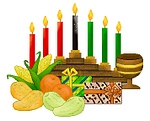Kwanzaa — What is it?
Each December the Outreach Program receives numerous inquiries about the festival Kwanzaa. This celebration is not a festival originating in any of the 55 African countries nor is it an “African” Christmas celebration. Kwanzaa is an African-American celebration of life from 26 December to 1 January.
Dr. Maulana Karenga introduced the festival in 1966 to the United States as a ritual to welcome the first harvests to the home. Dr. Karenga created this festival for Afro-Americans as a response to the commercialism of Christmas…The word “kwanza” is a KiSwahili (Kenya, Uganda, Tanzania) word meaning “first.”
Five common sets of values are central to the activities of the week: ingathering, reverence, commemoration, recommitment, and celebration. The seven principles (nguzo saba) of Kwanzaa utilize Kiswahili words: unity (umoja), self-determination (kujichagulia), collective work and responsibility (ujima), cooperative economics (ujamaa), purpose (nia), creativity (kuumba), and faith (imani). Each of the seven candles signify the principles. Like the Jewish Chanukah, candles are used to represent concepts of the holiday.
(From the University of Pennsylvania African Studies Center)


